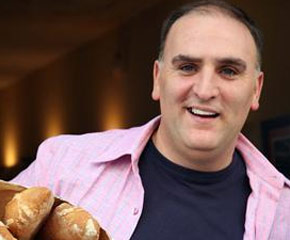Andres cited his parents for instilling in him a love for cooking. Whenever his father made paella for family and friends he put his son in charge of the fire. By 12, the younger Andres had mastered the traditional Spanish rice and seafood dish.
He pursued his culinary passion and trained with famed Spanish chef Ferran Adria, a pioneer of molecular gastronomy.
Since moving to the US in 1990, Andres has been the head chef and partner in a string of popular restaurants in Washington. He is also the host of “Made in Spain,” a US television food and travel series which debuted earlier this year.
He spoke about his passion for cooking and why he does not like to eat alone:
Q: How do you describe your cuisine?
A: “My cooking is a kind of a reflection of what I grew up with from the perspective of where I live today – never leaving one or the other, but the two things. While I went down this road, my team and I developed a creative process that allows us to create new concepts, sometimes based on new cultures. I think we are like anthropologists.”
Q: Who inspired you to become A chef?
A: “My parents were always cooking so that was something that got me interested as a boy. I was very fascinated with end-of-the-month cooking. You know money is tight and you need to stretch the peseta. Croquetas would materialize from flour, milk and leftover chicken. Lentils that earlier in the month would get sausage and many good things were now plainer, more austere but no less delicious thanks to my mother’s ingenuity.”
Q: Which chefs do you admire and why?
A: “I think everyone you work with has something to teach you, whether it is Ferran Adria or a humble prep cook. Everyone has some magic in the kitchen. You just have to look and to listen – with respect always. Obviously Ferran has been a huge influence on my professional trajectory. He taught me to be methodical, to be organised, to be deliberate.”
Q: What advice do you have for aspiring chefs?
A: “Keep it simple. Remember that a few good things can sometimes be better than a ton. Let a few things speak. If not, you get a big mess. Expensive is not always better. Get the best, most beautiful, juicy tomato you can find in season and compare it to mediocre foie or something. What do you prefer? Be humble. Remember you are learning. You need to be willing to take instruction and direction from others. Be patient.”
Q: What do you cook for yourself if you eat alone?
A: “I don’t cook much for myself alone. By myself, I probably just drink a glass of white wine. Albarino probably! I don’t like to eat alone… The act of sharing a meal is important, the communal nature of it. Families or friends gather around a table. You talk. You visit with each other. That is the way it should be at home or in the restaurant.”

